Independent software testing services play a crucial role in enhancing software quality by providing unbiased validation across various types of software testing, such as functional testing, performance testing, and automated testing.
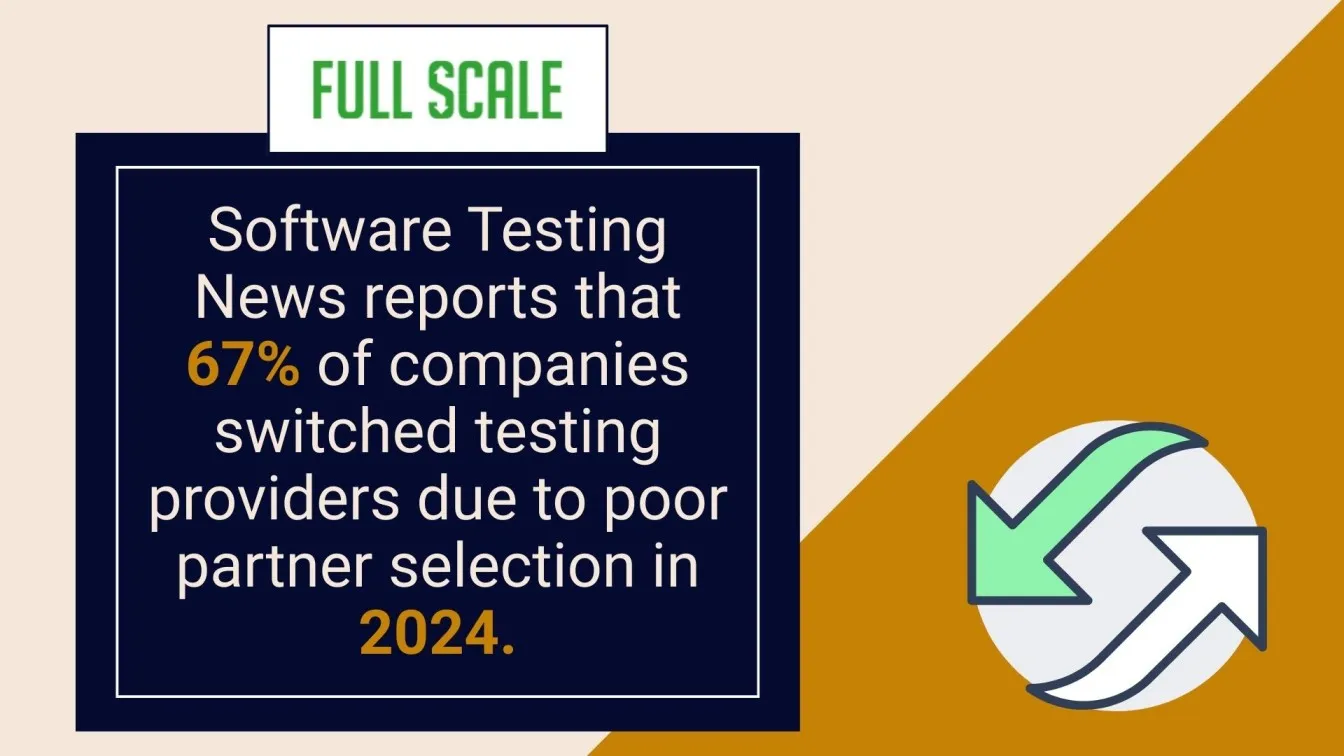
These services align with the SDLC process to ensure smooth delivery and reduced risk. With the rise of agile testing and automated software testing, organizations now focus on faster releases without compromising quality. Backed by advanced software testing tools and supported by expert software testing companies, these services ensure reliable, scalable applications, making them essential in today's software development lifecycle.
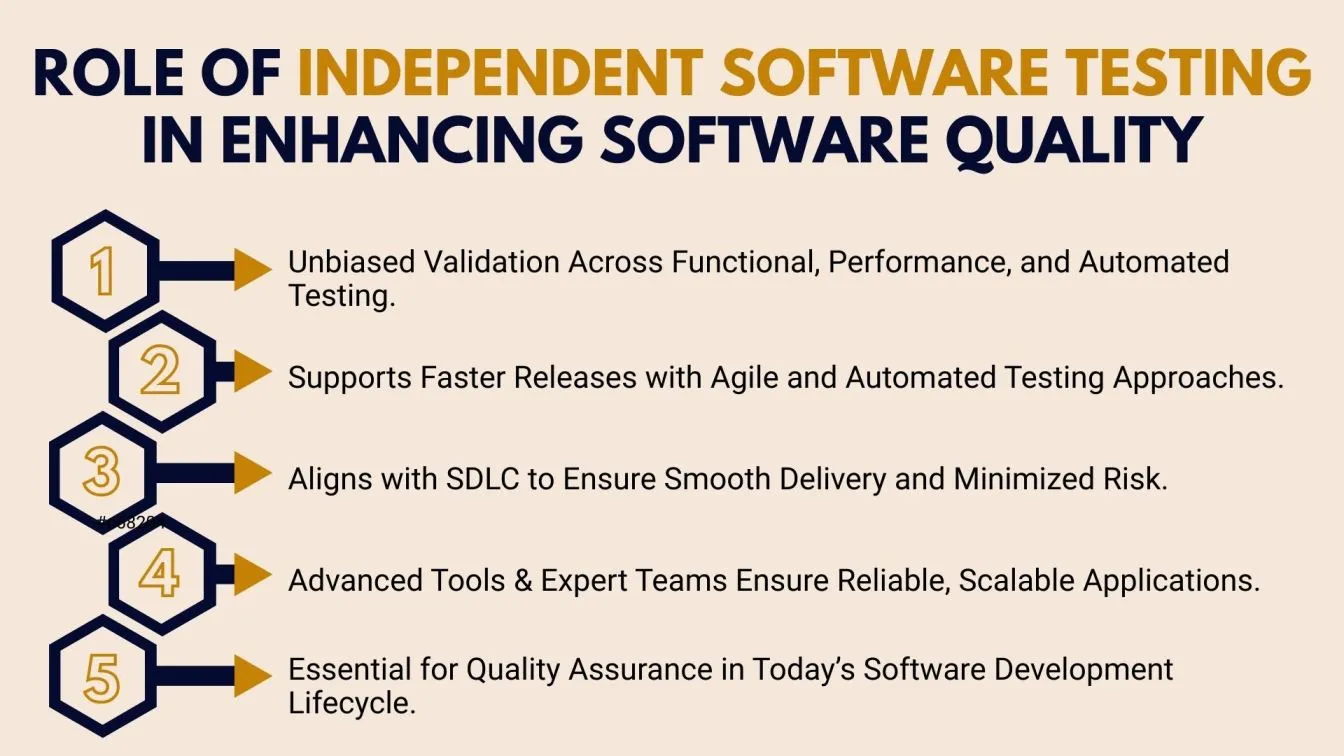
What’s next? Keep scrolling to find out:
🚀 Independent Software Testing: Overview of independent testing services and their role in quality assurance.
🚀 Benefits: Advantages of choosing independent testing over in-house QA.
🚀 Types of Services: Key types of independent testing offered, including functional and automation.
🚀 Challenges & Metrics: Common challenges and important metrics to track in testing projects.
🚀 Tools & Best Practices: Essential tools and best practices for effective independent software testing.
What Are Independent Software Testing Services?
Independent software testing services are offered by third-party providers to ensure objective evaluation of an application’s functionality, performance, and overall quality. These services operate separately from the development team, aligning with the SDLC life cycle to improve product reliability and user trust.
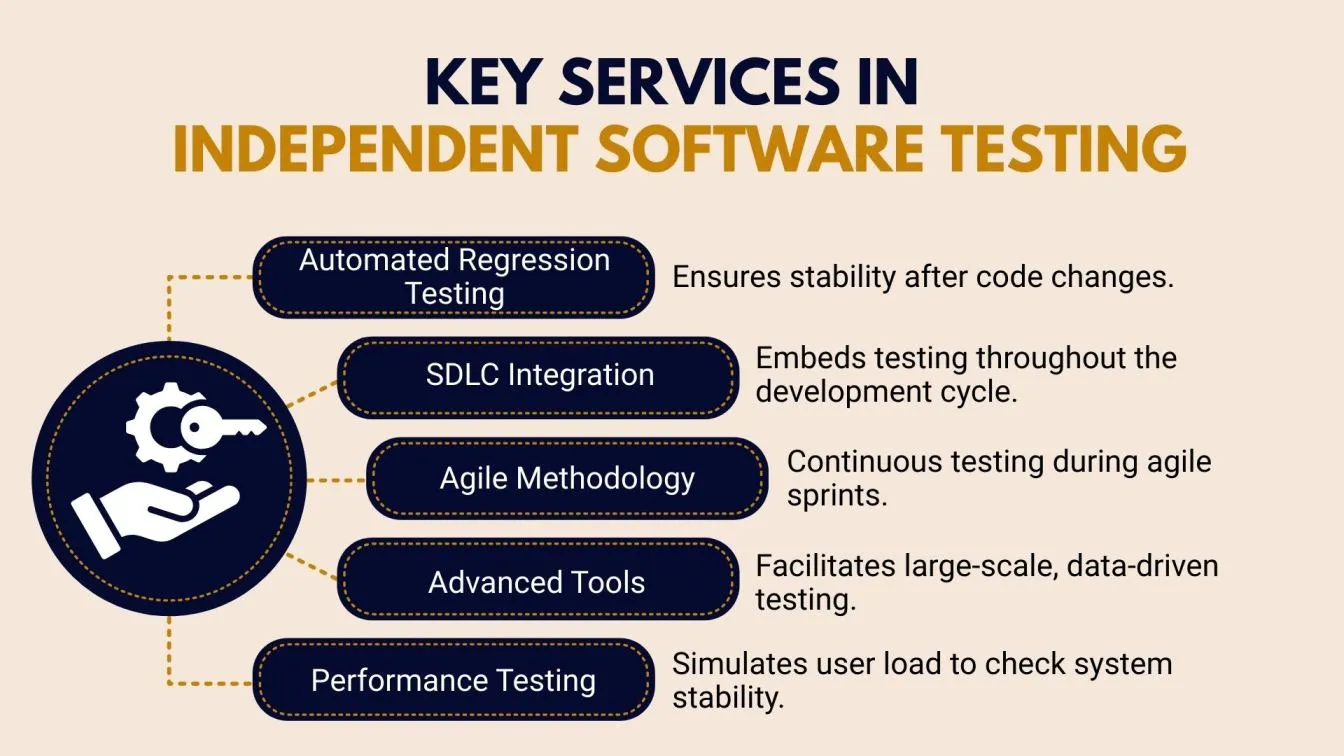
- Automated Regression Testing: Helps verify system stability after code changes without re-running all test cases manually.
- Testing Integration with SDLC in Software Engineering: Enhances software quality by embedding testing throughout all SDLC phases.
- Agile Methodology in Testing: Supports iterative development by enabling continuous testing during agile sprints.
- Advanced Automated Testing Tools: Empower teams to run large-scale and data-driven test cases across environments.
- Performance Testing Software: Simulates varying user loads to monitor system responsiveness and stability.
- Automated Testing Services: Offer scalable solutions for frequent test execution and faster delivery cycles.
- Software Quality Services: Focus on improving long-term system health, maintainability, and compliance.
Benefits of Choosing Independent Testing Over In-House QA
Opting for independent testing over in-house QA offers greater objectivity, broader expertise, and enhanced efficiency. These external teams bring in proven methodologies, tools, and scalability that may not be readily available within internal QA departments.
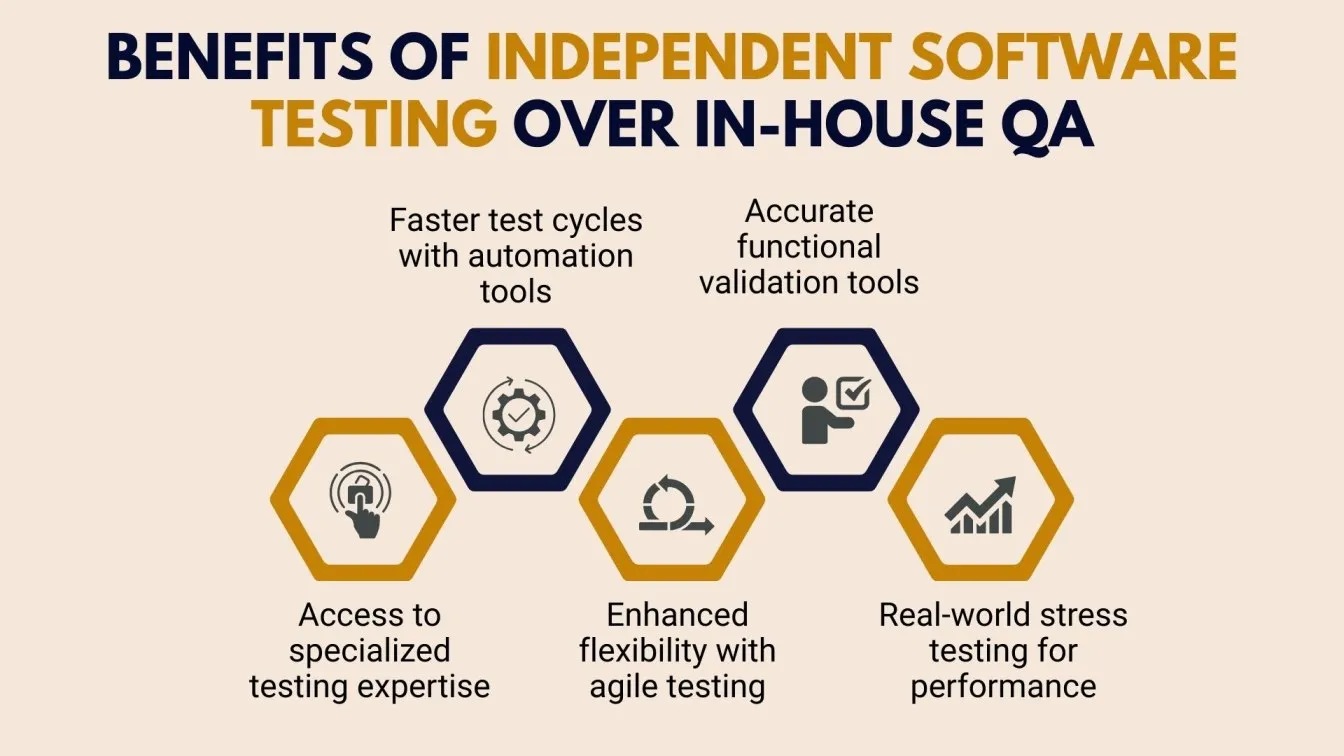
- Specialized Resources: Gain access to professionals trained through a software testing course with expertise in diverse test scenarios.
- Advanced Testing Solutions: Benefit from automated testing software that accelerates test cycles and reduces manual errors.
- Focused Agile Testing: Enhance flexibility and responsiveness with agile testing in software testing environments.
- Efficient Functional Validation: Leverage top-tier functional testing tools for accurate and efficient validation of core business logic.
- Targeted Performance Evaluation: Rely on expert teams for automated performance testing that ensures systems handle real-world stress.
- Scalable Functional Coverage: Use comprehensive functional testing services to validate complex workflows at scale.
- Up-to-Date QA Practices: Stay ahead with modern qa software testing approaches aligned with current industry standards.
Types of Independent Software Testing Services Offered
Independent testing providers deliver a wide range of services that support comprehensive quality checks across the SDLC life cycle. These services ensure that applications meet both functional and non-functional requirements using specialized tools and expert strategies.
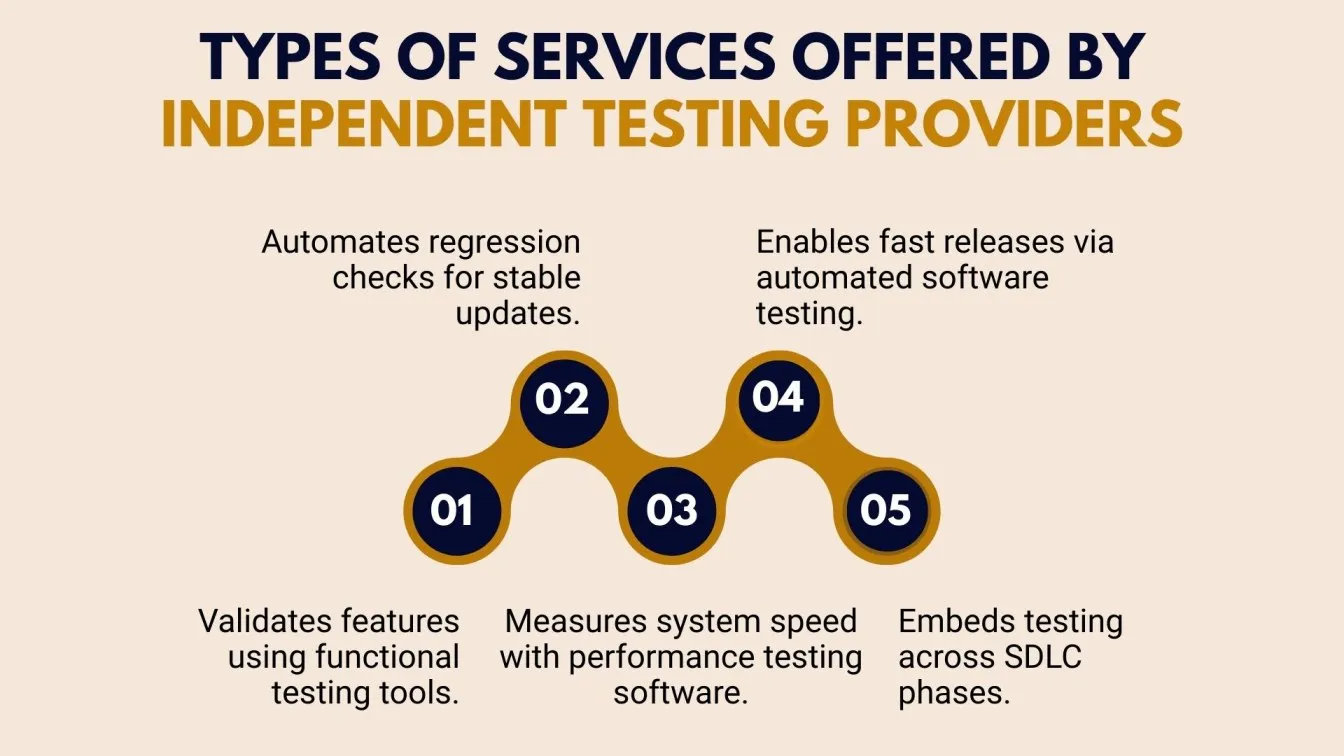
- Functional Testing: Verifies that applications perform as expected through precise functional testing tools and frameworks.
- Automated Regression Testing: Ensures previously developed features remain intact after updates using automated testing tools.
- Performance Testing: Evaluates app behavior under stress using scalable performance testing software for reliability and speed.
- SDLC Testing: Independent testers embed quality checkpoints across various SDLC phases, improving delivery consistency.
- Automated Software Testing: Delivers faster release cycles and repeatable test execution through advanced automated testing software.
- Website Performance Testing: Assesses user experience and load management on live environments using modern performance testing tools.
Functional vs Non-Functional Testing in Independent QA
In independent QA, software is validated through two essential types of testing: functional testing and non-functional testing. Each type focuses on different aspects of the application, ensuring it performs optimally. By incorporating both, software testing companies deliver a comprehensive solution, ensuring high-quality, error-free software that meets user expectations.
Popular Tools Used in Independent Software Testing
Independent software testing is crucial for ensuring high-quality software by addressing various testing requirements throughout the development phase. These tools support different testing types and testing methods, enhancing the effectiveness of the overall testing process.

- Selenium: An ideal tool for automated testing, Selenium streamlines unit testing and functional tests, offering a more efficient testing process compared to traditional in-house testing teams.
- Appium: Used for user acceptance testing and mobile testing, Appium provides insights from a fresh perspective, ensuring apps meet user satisfaction across platforms.
- JMeter: A powerful tool for load testing, JMeter evaluates how well software handles user load, helping improve the system’s ability to handle high traffic.
- Postman: Best for API testing, Postman validates functionality and supports effective security testing, ensuring smooth data exchange and protection.
- LoadRunner: A tool for performance testing, LoadRunner simulates user interactions under high load, helping identify potential performance bottlenecks.
- QTP (QuickTest Professional): This tool excels in automated testing for functional and regression tests, delivering a high-quality product by thoroughly testing software components.
Best Practices for Independent Software Testing Teams
Independent software testing teams play a vital role in ensuring that software meets project requirements and delivers a high-quality product. Following best practices can help these teams perform effectively and efficiently across different testing types and testing methods.
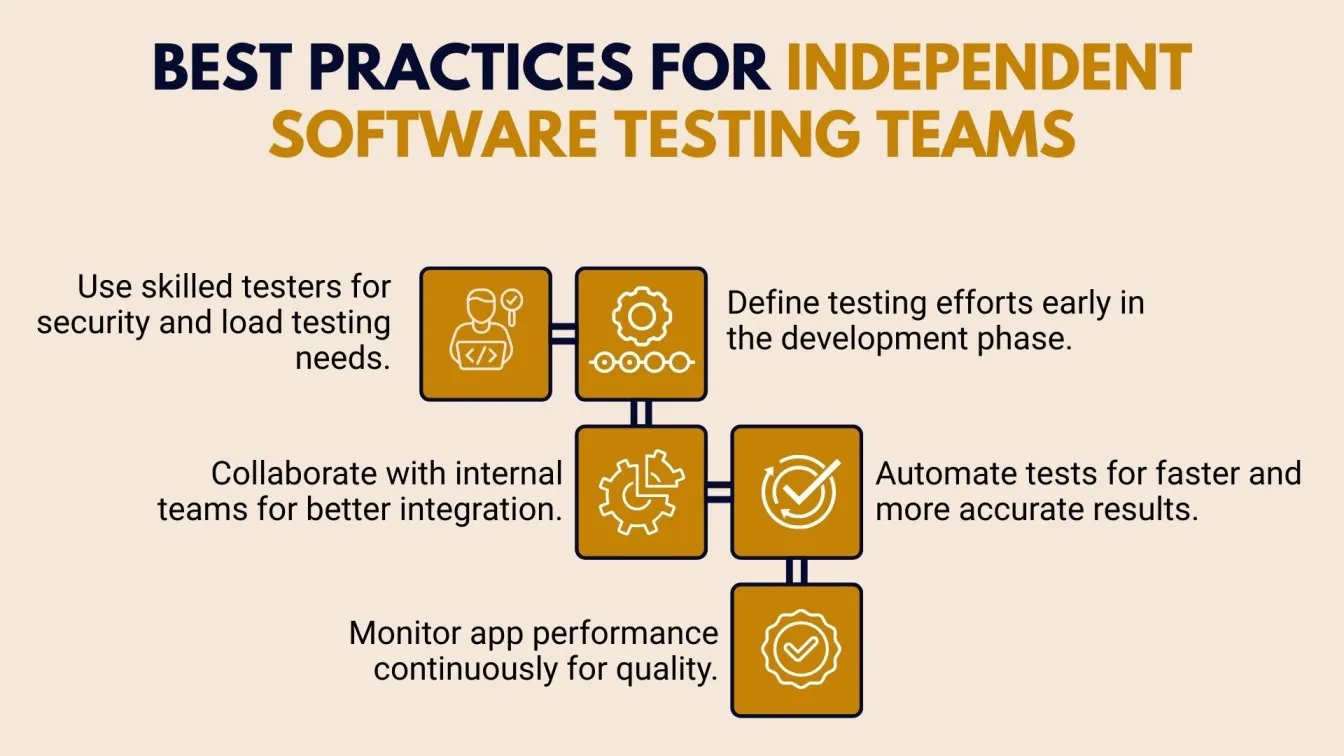
- Specialized Skills: Ensure team members have the required expertise in various testing methods, such as security testing and load testing, to tackle complex project requirements.
- Clear Testing Efforts: Define clear testing efforts at each stage of the development phase to address potential issues early on.
- Collaboration with Internal Teams: Work closely with the internal teams to align on testing requirements and ensure proper integration with the development process.
- Automation: Implement automated testing tools to reduce manual effort, ensuring more accurate and quicker feedback.
- Continuous Monitoring: Track the performance of the application using real-time data, focusing on user satisfaction and resolving usability issues swiftly.
Automation in Independent Software Testing Services
In today's fast-paced delivery cycles, automation in independent software testing services has become essential to improve efficiency, accuracy, and test coverage. These services help businesses accelerate release cycles, minimize human errors, and reduce long-term costs by implementing automated testing software tailored to their project requirements.
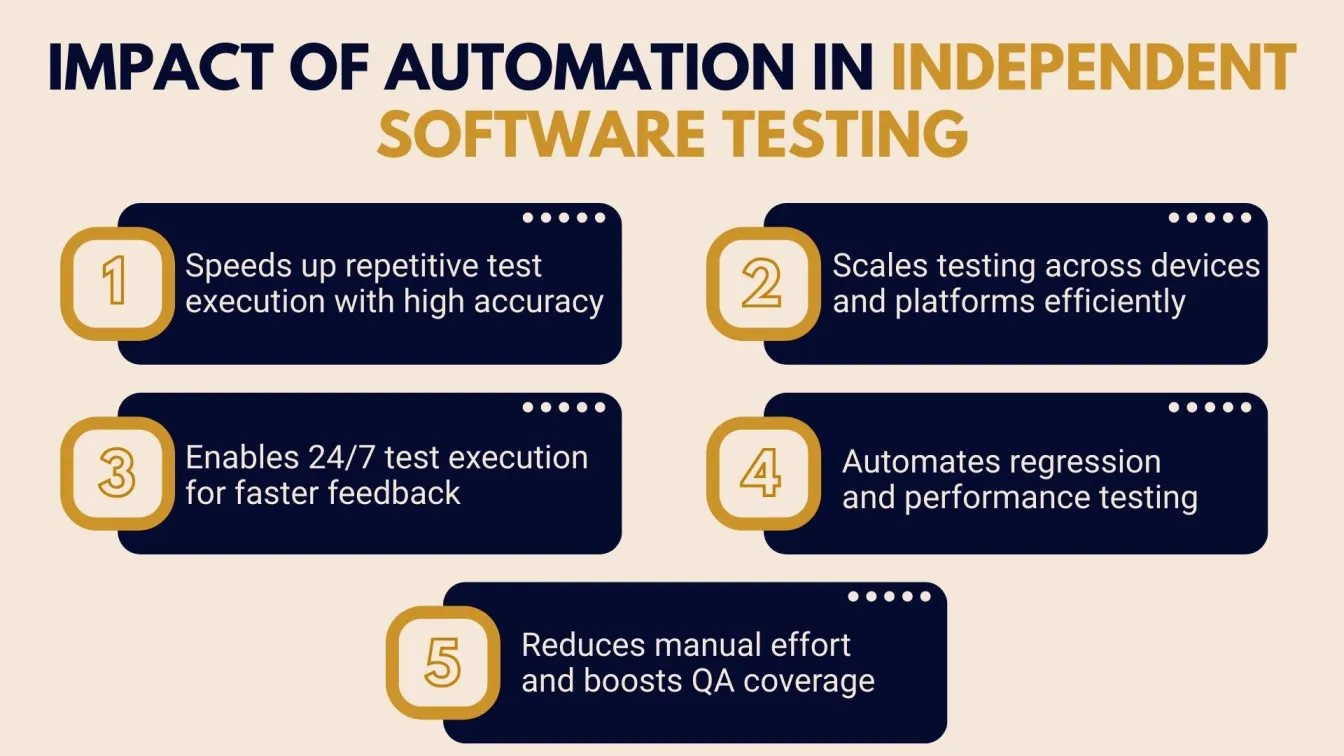
- Speed and Consistency: Automated testing executes repetitive test cases faster and more reliably than manual testing.
- Scalability: Automation allows independent QA teams to scale test scenarios across platforms and devices efficiently.
- Automated Regression Testing: It ensures previously developed features remain unaffected after code changes.
- 24/7 Execution: Tests can run around the clock, enabling overnight builds and quicker feedback loops.
- Automated Performance Testing: Tools simulate user load and identify performance bottlenecks early in the pipeline.
- Reduced Testing Efforts: Automation frees testers from redundant tasks, allowing focus on critical functionality.
- Enhanced Software Quality Assurance: Continuous integration of test automation supports faster defect detection.
Performance Testing Services by Independent QA Teams
Independent QA teams play a crucial role in ensuring applications perform optimally under varying conditions. Their performance testing services are designed to detect bottlenecks, optimize response times, and guarantee system stability. These services help businesses launch software products that meet speed, scalability, and reliability expectations across diverse operating systems and environments.
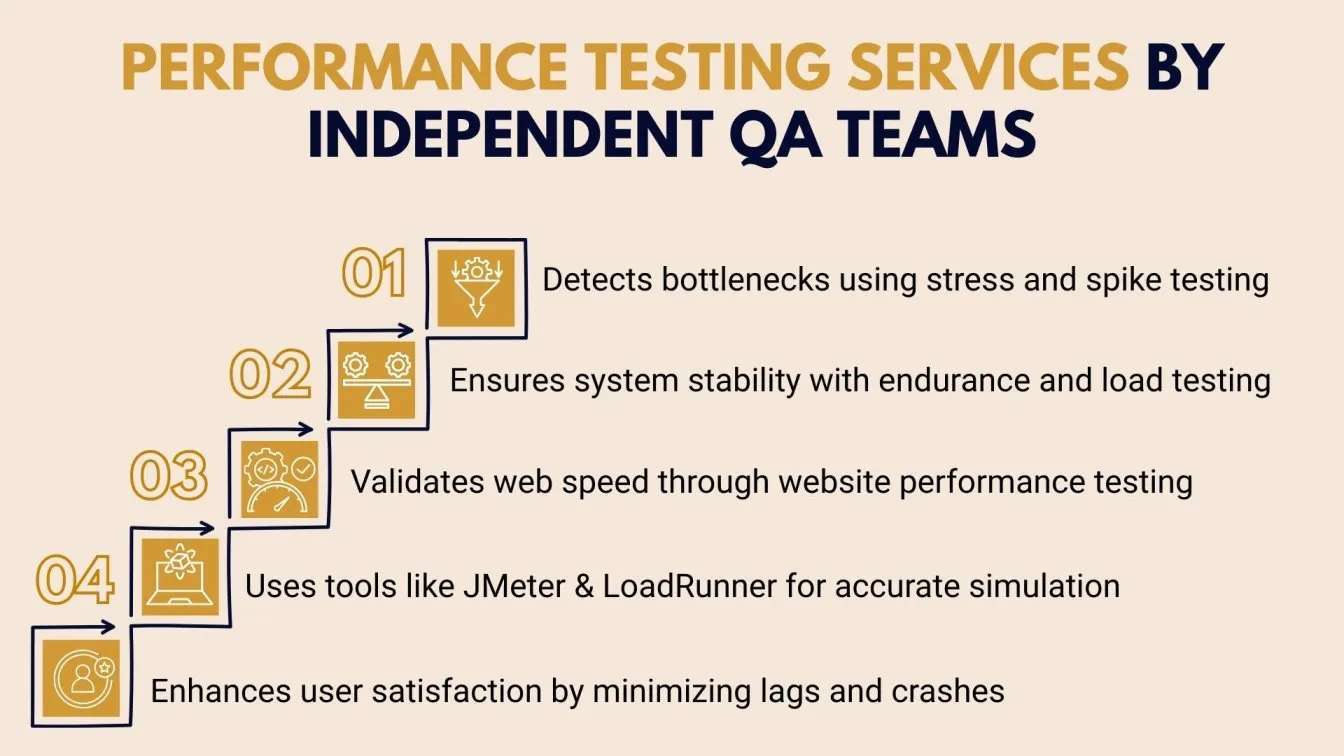
- Load Testing: Assesses how systems behave under expected user loads to detect lag and slowdowns.
- Stress Testing: Identifies the system's breaking point by applying extreme conditions and monitoring stability.
- Endurance Testing: Evaluates the application’s behavior over prolonged usage to detect memory leaks and degradation.
- Spike Testing: Simulates sudden traffic surges to ensure consistent performance during traffic bursts.
- Website Performance Testing: Ensures optimal speed and responsiveness for web platforms across browsers.
- Performance Testing Software Tools: Tools like JMeter and LoadRunner are commonly used to simulate user scenarios.
- User Satisfaction Focus: Ensures smooth experiences for users by eliminating lags and downtime risks.
Common Challenges in Independent Software Testing Projects
Independent software testing plays a vital role in ensuring high-quality software delivery, but there are several challenges that teams may face throughout the process. Here are some common challenges:
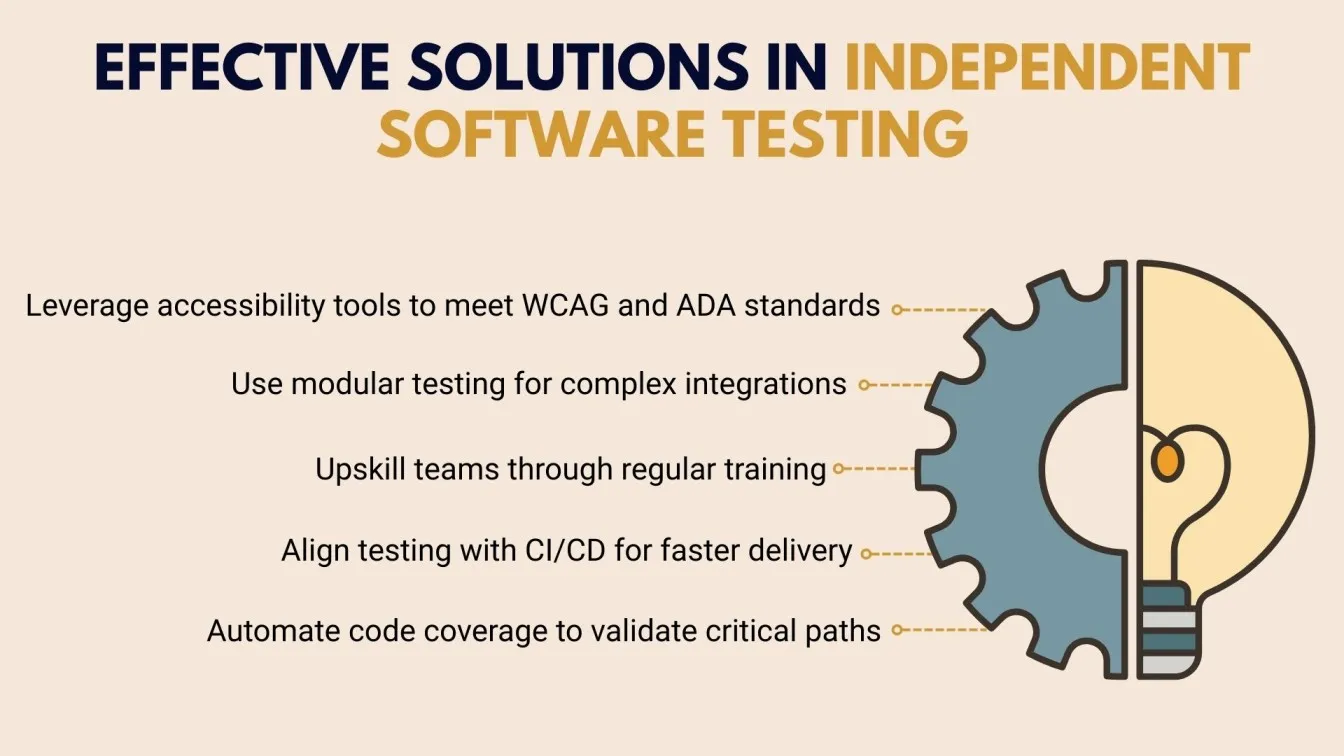
- Accessibility testing: Ensuring that software is usable by people with disabilities can be difficult, requiring specialized tools and expertise.
- Complex projects: Large, intricate systems often present a challenge due to the diverse range of functionality and integrations involved.
- Skill levels: Varying skill levels among testers can impact the consistency and quality of testing outcomes.
- Unbiased perspective: Independent teams must avoid internal biases that could affect testing results and objectivity.
- Continuous delivery: Adapting to fast-paced release cycles can strain testing efforts and require rapid turnaround times.
- Quality assurance process: Maintaining an efficient and rigorous quality assurance process becomes more difficult as projects scale.
- Code coverage metrics: Measuring the extent to which the code is tested can be challenging in complex applications.
How to Choose the Right Independent Testing Company
Finding the right independent testing partner is crucial for achieving comprehensive quality across your software applications and development cycles.
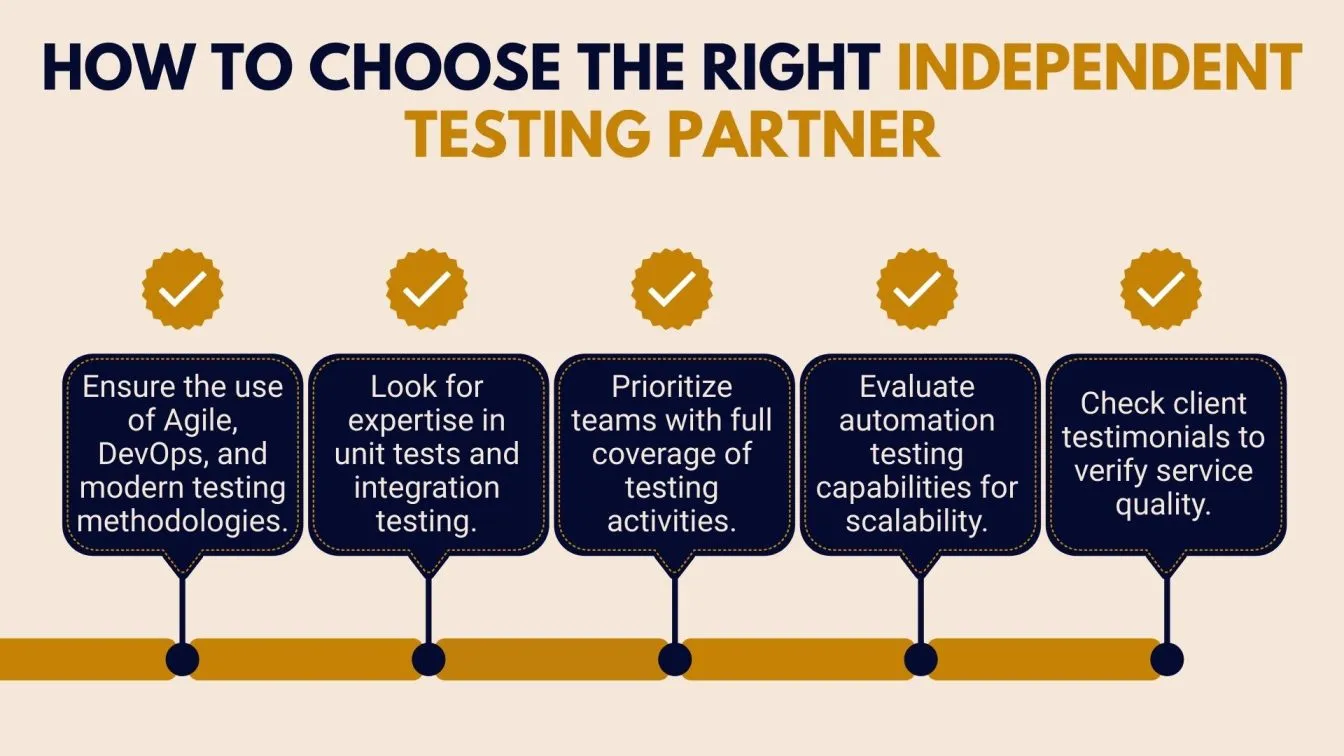
- Understanding Testing Methodologies: The company should apply modern testing methodologies like Agile, DevOps, and risk-based testing for consistent quality outcomes.
- Expertise in Unit Tests and Integration Testing: A strong team will execute unit tests and integration testing to catch defects early in the pipeline.
- Comprehensive Coverage of Testing Activities: Look for independent testing teams that ensure comprehensive coverage of all testing activities, including exploratory and risk-based testing.
- Automation Testing Capabilities: Ensure the team provides reliable automation testing for repeatable, scalable, and effective testing.
- Evaluation Through Client Testimonials: Analyze client testimonials to gain valuable insights into real-world performance and service delivery.
- Understanding of Types of Tests and Key Features: They should have expertise in various types of tests and the ability to validate key features that enhance customer satisfaction.
Understanding the Role of Independent QA in the SDLC
Independent QA ensures consistent quality across every crucial phase of the software development process, from requirements gathering to deployment. It helps identify critical issues before they reach production and supports a structured approach to testing.
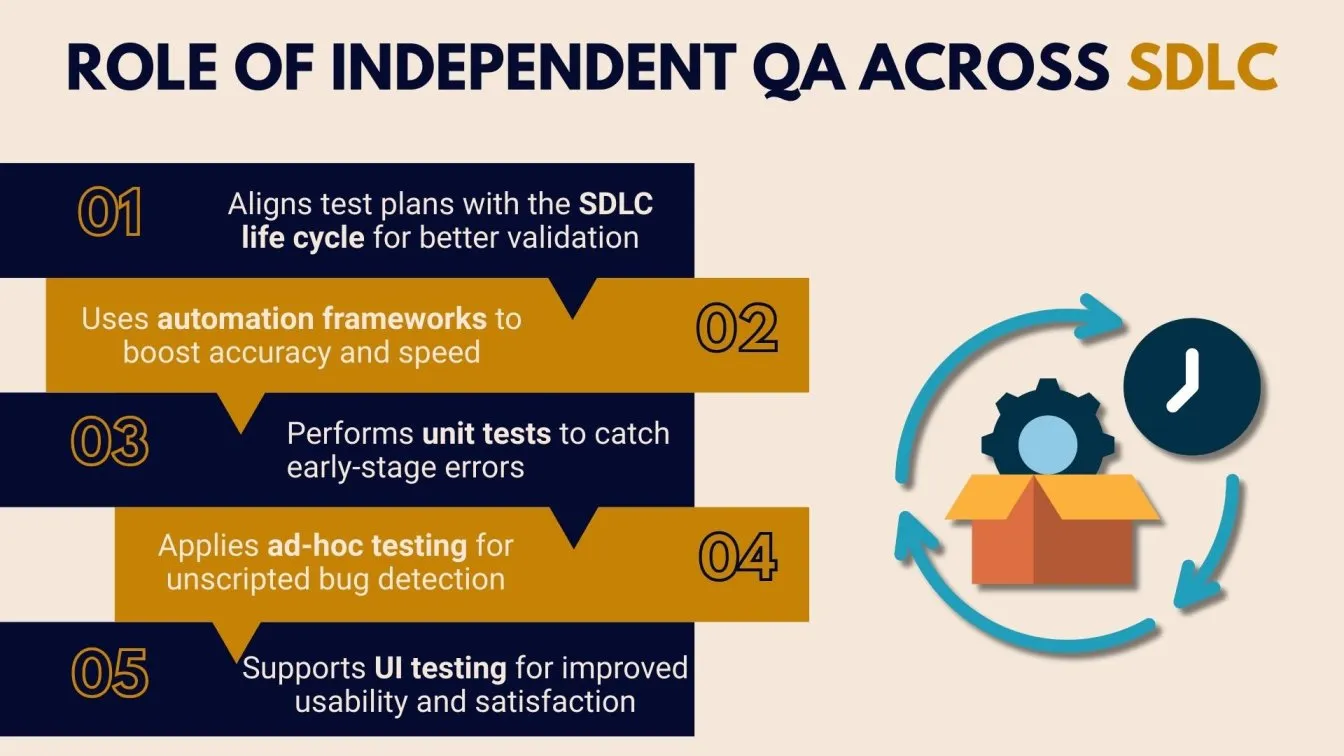
- Comprehensive Test Plan: QA teams create a comprehensive test plan that aligns with the SDLC life cycle to validate each deliverable.
- Automation Framework: They implement a robust automation framework to enhance test accuracy and reduce manual effort.
- Individual Units Testing: Independent teams validate individual units through unit tests, ensuring error-free components.
- Ad-hoc Testing Coverage: Unscripted ad-hoc testing uncovers unexpected bugs missed in scripted tests.
- Cost Savings: Early detection reduces rework, resulting in significant cost savings.
- User Interface Testing: Verifying the user interface ensures better user satisfaction and product usability.
- Quality Standards: QA ensures that every release meets industry-accepted quality standards and supports a consistent approach to software testing.
Key Metrics to Track in Independent QA Testing
Tracking the right metrics is essential for independent QA teams to measure the effectiveness of testing efforts and ensure the success of the SDLC. These metrics provide insights into the quality, progress, and efficiency of the testing process.
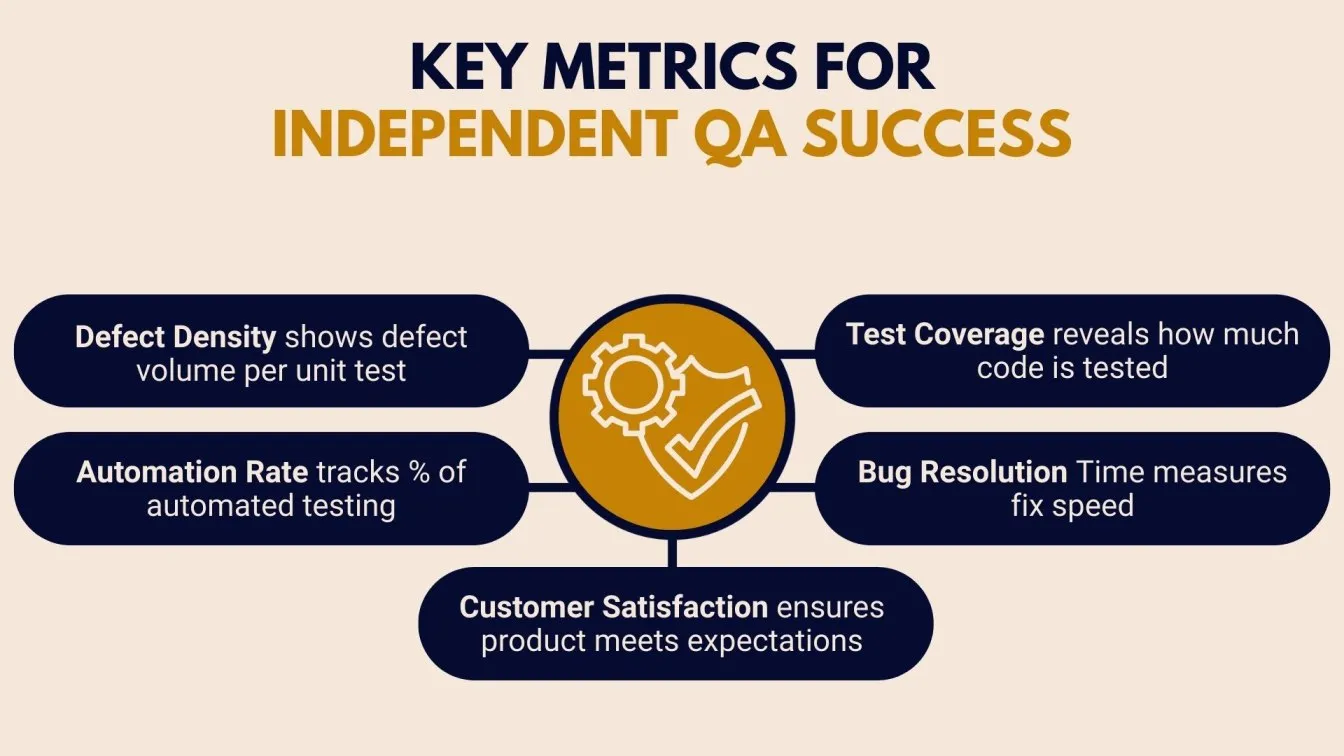
- Defect Density: Measuring the number of defects per unit test helps assess the stability and quality of software.
- Test Coverage: Ensuring comprehensive testing by tracking the percentage of application code covered by tests.
- Automation Rate: Monitoring the automation testing percentage gives insight into how much of the testing process is automated, increasing efficiency.
- Bug Resolution Time: Tracking the average time taken to fix bugs, indicating how swiftly the QA software testing team addresses issues.
- Test Execution Time: Evaluating how quickly tests are executed helps improve testing activities and optimize the testing process.
- Customer Satisfaction: Gauging how well the software meets user needs, ensuring user satisfaction and product acceptance.
Final Thoughts
Independent software testing services are vital for delivering high-quality, reliable, and scalable software. By leveraging specialized expertise, advanced tools, and proven methodologies, these services enhance the software development process, ensuring that products meet both functional and non-functional requirements. With a focus on automation, performance, and thorough validation, independent QA teams are instrumental in ensuring smooth releases and user satisfaction across all stages of the SDLC.
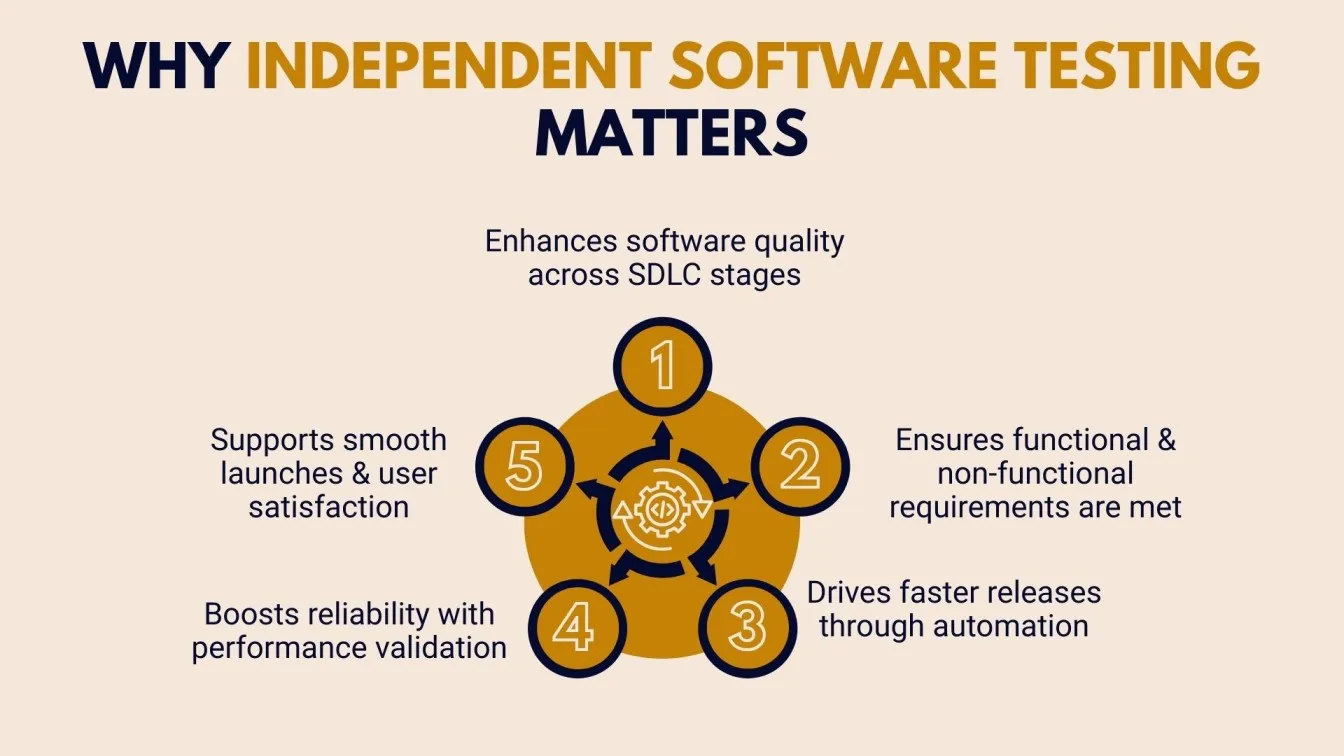
Frugal Testing offers comprehensive functional testing services to ensure software meets high-quality standards. Their bug testing services identify and resolve critical issues quickly, providing reliable results. Leveraging AI-driven test automation services, Frugal Testing accelerates testing cycles while ensuring accuracy. As a software testing service provider based in Hyderabad, they offer scalable solutions to businesses, enabling efficient quality assurance across various applications and projects.

People Also Ask
How do independent testers handle legacy systems during testing?
Independent testers apply specialized techniques to ensure compatibility and stability in legacy systems while identifying necessary updates.
Can independent testing services help with compliance and regulatory standards?
Yes, independent testers ensure compliance with industry regulations, helping businesses meet required standards and avoid penalties.
What’s the cost structure of independent testing services?
The cost structure typically varies by project scope, complexity, and duration, with options for fixed-price or hourly rates.
What is the turnaround time for independent QA projects?
Turnaround time depends on project size and complexity, with timelines agreed upon before starting the project.
What are the risks of not using independent QA services?
Not using independent QA can lead to overlooked bugs, security issues, and poor software quality that harm user experience and reputation.



.webp)

%201.webp)

